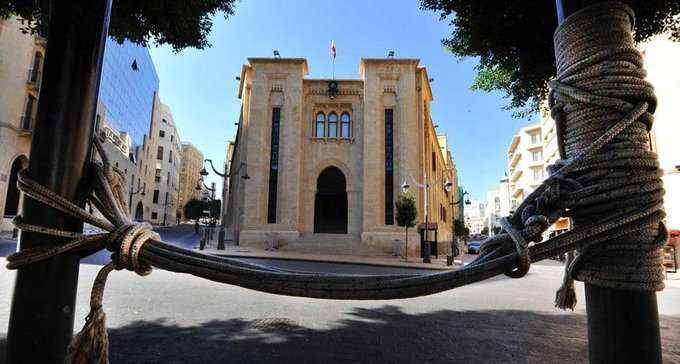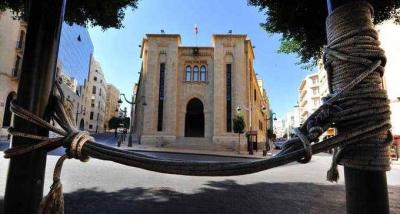Two images dominated the scene during the first session of the new parliament: 13 MPs representing the October 17, 2019 uprising walking to the Parliament Square from the destroyed Beirut Port, and a dabke dance performed by security personnel in front of the Speaker of the House Nabih Berri's office in Ain al-Tineh. In the first image, the tears of the families of the victims of the August 4, 2020 port explosion urged the MPs not to forget justice for their case. In the second image, the security personnel appeared to be a militia for the leader of the "Amal" movement and not affiliated with an official institution.
Meanwhile, there were many themes presented during the first session of Parliament 2022. They indicate that the elections held on May 15 were significant for Lebanon's democratic process. This country, burdened with troubles that make elections a luxury, proved to be resilient when called to make a choice. Observers of the first day of the new parliament's work noted that the 13 MPs, dubbed "the change makers," were more prominent than other MPs who were supposed to form the new majority, which included those labeled as "sovereign" and "independents."
These 13 MPs (may 13 be a lucky number for change) surprised attendees at the May 31 session by voting for the candidate for the second presidency with ballots that carried slogans like "Justice for Lokman Slim" (the four MPs of the Kataeb party also voted this way), "for the victims of the port explosion," "for the victims of the council police," and "for raped women." MP Halimeh Qaqour, one of the 13, stated she voted with the phrase "Justice for the victims of the council police," and demanded accountability for the violence they exercised against the activists of October 17. Additionally, her colleague, MP Firas Hamdan, appeared on the steps of the Parliament building covering one of his eyes, indicating that he was one of the victims of this police force.
In contrast, Speaker Nabih Berri's reaction to the ballots of the 13 MPs was dismissive of the phrases of justice to the extent that he initially ignored reading them. However, he relented after the authors objected, returning to recite them. But Berri, who has been Speaker for the seventh time in 30 years, openly supported the violence of his police when he was assured that he would serve another four years in his position, saying: "Thank you to the army, security forces, and the council police." It is worth mentioning that Berri, after decades of leading the parliament, has formed a loyal security team to him as the head of the "Amal" movement, and this team quickly began dancing in Ain al-Tineh to celebrate their leader's victory.
If the issue was limited to the dancing of Berri's personnel, it might have been tolerable. However, it included celebratory gunfire that resonated in the session. Here, MP Sami Gemayel asked President Berri after his election: "Mr. President, I was informed that gunfire is ongoing outside." Berri responded, "I issued a statement, what can I do!"
Furthermore, a Lebanese doctor, a surgeon at Harvard University Hospital in the United States, recounted to me that when he was 12 years old, during a sports class in one of the schools in Ras Beirut, a stray bullet landed near him during a celebration by Berri's supporters following his first election as Speaker of Parliament in 1992. The doctor told me, "I think I miraculously survived 30 years ago. I kept the bullet as a memory of that fateful day.”
Additionally, a citizen in Badna'il in the Bekaa Valley stated that the billions spent on gunshots fired by supporters of "Hezbollah" and "Amal" the day after the last parliamentary elections to celebrate their victories would have brought joy to many impoverished families had they received aid.
Perhaps MP Jamil al-Sayyid should be excluded from the scene of celebratory gunfire. After Berri's seventh election as Speaker, al-Sayyid faced harassment at his home in the Janah area of Beirut by members of "Amal," after he previously declared he would not vote for Berri in the last session.
From the images of the march from the port and the dance in Ain al-Tineh, to the broader picture concerning the reality of the majority in the new parliament, "Hezbollah's" interpretation of the results from the previous day’s session, according to the party's "Al-Manar" channel on the evening of May 31, is as follows: "Nabih Berri elected as Speaker of Parliament for a seventh term, Elias Bou Saab as Deputy Speaker—what more is needed to calculate the parliamentary seats and the majority and its paths?"
The head of the Progressive Socialist Party, Walid Jumblatt, tweeted: "After yesterday’s defeat of the new majority in the parliament in the election of the Deputy Speaker due to poor coordination, it may be best to formulate a joint program that transcends secondary contradictions to confront the Syrian-Iranian March 8 coalition, which, let us remind, will take revenge for its defeat in the elections by all means and will spare no one."
This is the beginning, on both sides: the March 8 side, which "Hezbollah" has reactivated and joined with the "Free Patriotic Movement" after temporary resistance, and the “sovereign” and “change” factions. The latter, while fully appreciating their performance, seem yet to believe that they are indeed in parliament. As for the "sovereigns," they still appear to largely be under the weight of fear from the Iranian hegemony that has targeted them with assassinations since the crime of assassinating President Rafik Hariri on February 14, 2005.
All eyes are now on the upcoming test in forming the new government, and the name of the designated president will be indicative of the reality of the new majority in Parliament 2022.




